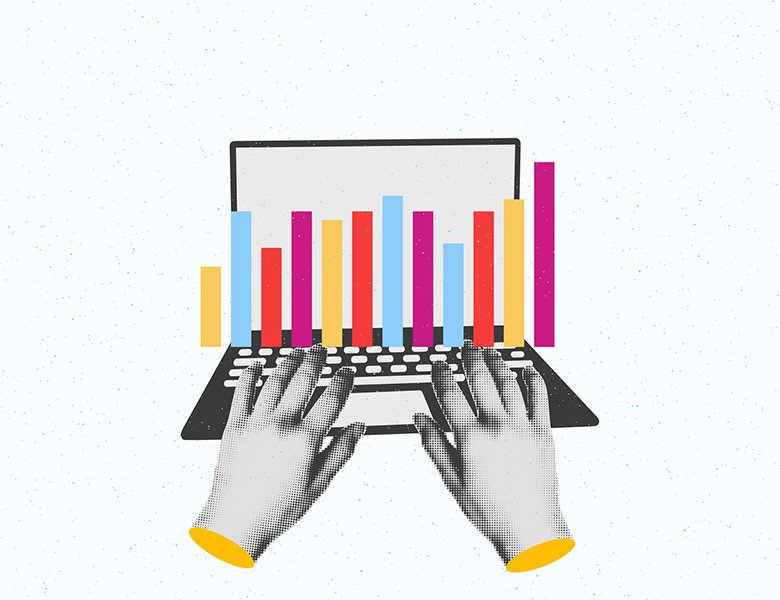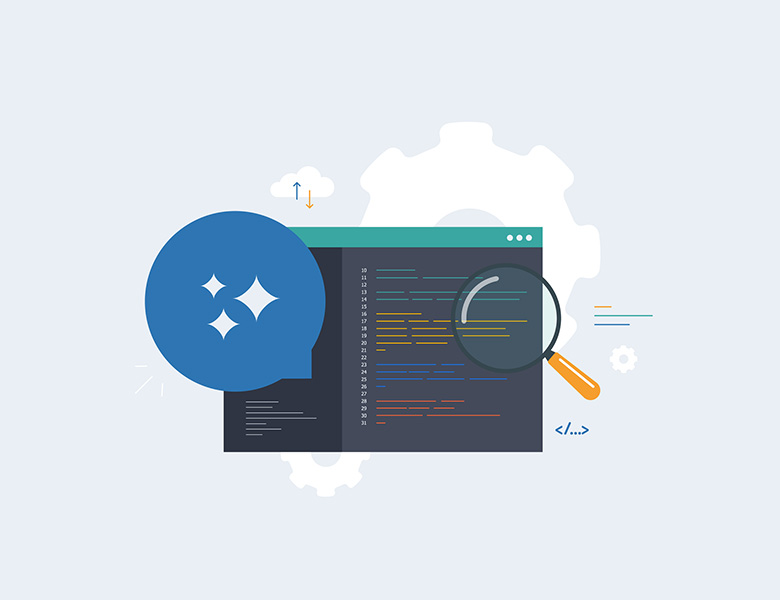As artificial intelligence becomes more integrated into our daily lives, trust and accountability become more important than ever. To make AI responsible, we need clear standards that prioritize these values at all stages, from system design to use.
Responsible AI is about developing and deploying AI in ways that benefit society while mitigating risks. Key principles such as fairness, transparency, privacy, and safety guide this process, so our AI systems are consistent with our values.
In this article, we will look at what Responsible AI is, why it is important, and how businesses can balance ethics and innovation. Furthermore we’ll examine Solwey’s approach to this critical topic. The goal is simple: to create AI that benefits everyone and contributes to a better future for all.
Core Values of Responsible AI
To build responsible AI systems, four core values must be part of the design from the very beginning: fairness, interpretability, privacy, and safety.
Fairness in AI
Fairness is critical in AI, especially since these systems are increasingly used in sensitive decision-making areas like job recruitment, healthcare diagnostics, and education. If AI systems are biased, they can unintentionally reinforce or even amplify existing inequalities. For example, a hiring algorithm trained on past data may favor one group over others, reflecting biases from the past.
Achieving fairness, however, is challenging. Bias can creep in through the training data, especially if that data reflects societal biases. There's also a cultural aspect—AI models trained in one country may not perform fairly in another due to regional differences. To address fairness, AI developers must use diverse datasets, seek feedback from a broad range of stakeholders, and rigorously test systems after deployment. By doing this, we move closer to AI systems that respect fairness in different contexts.
Interpretability in AI
Interpretability is another key value in Responsible AI. It is important that users understand how and why an AI system makes decisions. This is especially important in high-stakes fields such as healthcare and criminal justice, where decisions must be transparent.
However, interpretability can be tricky with modern AI, particularly in deep learning models that are built on complex architectures and millions of parameters. These models are harder to understand than traditional software, making it difficult to trace errors. To tackle this, the tech community has developed several interpretability tools, like visualizations and model attention mapping, which help clarify how decisions are made. These tools are helping to improve transparency, allowing stakeholders to trust and safely deploy AI systems.
Privacy in AI
Privacy is one of the most important ethical considerations in AI, as these systems often handle sensitive and personal information. Responsible AI development requires protecting user data from unauthorized access or misuse.
However, privacy challenges are significant. Machine learning models can sometimes retain specific details from the data they were trained on, which can lead to the exposure of sensitive information. As AI systems grow in complexity, safeguarding privacy becomes even more crucial. To address these challenges, developers use techniques like on-device processing (which minimizes data transfer), federated learning (which distributes training across user devices), and secure aggregation protocols (which protect data in collaborative models). These practices help ensure AI respects user privacy while still being effective and useful.
Safety and Security in AI
Safety means building models that work as expected under different conditions and remain resilient against misuse.
The challenges in this area are significant. AI systems can be vulnerable to attacks where the input data is subtly altered to deceive the model. For example, a self-driving car’s vision system could misinterpret a stop sign if it’s tampered with. Other attacks include model theft or data poisoning, where malicious actors tamper with training data to manipulate the model’s results.
To address these risks, developers use practices like adversarial testing and red teaming, where models are tested against potential attack scenarios. By taking these proactive steps, we can help ensure AI systems are secure, reliable, and responsible in their applications.
By embedding these core values into AI development, we can create systems that are more likely to have a positive impact on society. Building trust and accountability into every stage of the AI lifecycle is key to achieving Responsible AI.
Implementing Responsible AI: Key Strategies
To implement Responsible AI effectively, organizations must establish governance and strategies that uphold ethical standards throughout the AI lifecycle. Here are some key strategies that leading companies adopt:
Structured Review Process
A well-organized review process is needed for assessing AI applications prior to their deployment. These evaluations guarantee that every AI system adheres to ethical benchmarks, emphasizing the minimization of potential harm, upholding transparency, and fostering inclusivity. Through meticulous examination of AI applications via thorough reviews, organizations can pinpoint and tackle ethical risks at the outset of the development cycle, effectively averting potential issues before they emerge.
Continuous Research and Development
Responsible AI is not just a one-off initiative; it needs continuous research that helps it improve and evolve. Ongoing research and development drive improvements in fairness, transparency, and reliability, helping improved bias detection and strengthening system robustness. This continuous investment guarantees that organizations remain informed about new ethical challenges and cultivate innovative strategies for building reliable AI.
Stakeholder Engagement
Working together with a diverse array of stakeholders—such as policymakers, researchers, and the public—guarantees that Responsible AI practices are in alignment with the wider societal needs. Involving stakeholders enables organizations to embrace a range of viewpoints, essential for developing AI that honors different ethical and cultural values.
These governance and implementation strategies demonstrate a commitment to Responsible AI that is adaptive, inclusive, and guided by a strong ethical foundation. Together, they form a framework that supports responsible innovation and ethical AI deployment.
Challenges in Implementing Responsible AI
Even with strong principles and governance in place, implementing Responsible AI is very hard. Let’s explore some of the primary hurdles faced by organizations and researchers in this field:
Bias Elimination
One of the biggest challenges is ensuring fairness across all AI systems. Bias can arise from many sources, including the data used, model design, or even unintended patterns in deployment. Achieving complete fairness is complex, and eliminating bias requires continuous improvement in model training, evaluation, and data collection. It's an ongoing process to refine AI models so that they are equitable for all users without unintentionally favoring or disadvantaging any group.
Preventing Misuse
As AI becomes more powerful, the risk of it being used for unethical or harmful purposes increases. For example, advanced AI could be misused for surveillance, spreading misinformation, or automated discrimination. To counter these risks, vigilant oversight and frequent updates to policies and controls are essential. Organizations must stay proactive in identifying potential misuse and adjusting safeguards so that AI is used responsibly.
Adapting to Emerging Risks
AI technology is advancing rapidly, which means new risks can emerge as systems become more capable and complex. These risks may involve issues related to security, privacy, or unexpected behavior in AI systems. Continuous research and proactive adaptation are vital to address these evolving risks. Organizations must remain flexible and responsive to ensure that their AI systems stay safe, secure, and aligned with ethical standards.
Key Takeaways from Responsible AI
The journey toward Responsible AI is about balancing cutting-edge innovation with strong ethical standards. From addressing fairness and privacy concerns to ensuring interpretability and security, Responsible AI focuses on building trust and aligning AI systems with societal values.
A key takeaway is the importance of continuous improvement. As AI systems grow in influence and reach, they must be regularly monitored, updated, and refined. This helps prevent unintended consequences and ensures that AI serves the public good.
Responsible AI is also a shared responsibility. It requires collaboration among developers, researchers, policymakers, and the public to set standards and ensure systems are designed and deployed ethically. As AI technology continues to advance, these principles will be crucial for building trust and accountability in AI applications worldwide.
Why Solwey is a Leading Choice for Responsible AI Development
Solwey is a premier option for AI development, not only for its innovative solutions but also for its commitment to implementing Responsible AI practices. The firm integrates AI into custom software solutions in ways that enhance both functionality and user experience while complying to ethical standards that promote fairness, transparency, and security. Here's how Solwey exemplifies responsible AI development:
Ethical AI Integration
Solwey is deeply committed to embedding ethical principles into every AI solution they develop. From automating tasks to processing vast datasets, Solwey designs AI systems to minimize bias and uphold fairness. By focusing on creating systems that are inclusive and equitable, they help clients build AI applications that serve all users without unintended harm.
Bias Mitigation and Data Quality
When leveraging AI for advanced data analysis, Solwey pays close attention to the quality and diversity of the data used. The firm is aware of the potential for biases to creep into AI models and takes proactive steps to mitigate them. By curating diverse datasets and continuously refining their models, Solwey develops AI solutions that are fair and unbiased, which is especially important in sensitive fields like healthcare and finance.
Transparency and Accountability
Solwey's custom AI solutions are designed with transparency in mind, allowing clients to understand how decisions are made within AI systems. The firm emphasizes the importance of accountability, making their systems auditable and enabling stakeholders to trace AI outcomes back to their sources. This commitment to transparency builds trust and aligns with Responsible AI principles, making it easier for clients to adopt AI with confidence.
Privacy and Security by Design
Solwey integrates privacy-preserving technologies into their AI systems, protecting user data throughout the development process. By incorporating secure data aggregation and other privacy-focused techniques, they prevent data leaks and safeguard user information. Solwey’s approach to AI security keeps their systems safe and secure, following both ethical standards and regulatory requirements.
Continuous Learning and Improvement
Solwey’s AI models are not static but evolve over time. By implementing continuous learning mechanisms, they enable AI systems to adapt to new data and changing conditions. This ongoing refinement helps the AI remain relevant, accurate, and aligned with ethical goals, even as it scales and interacts with diverse user groups.
Human-Centered AI Solutions
Solwey’s approach to AI development is deeply human-centered. They prioritize user needs, creating AI solutions that are not only technically robust but also intuitive and accessible. Whether it’s through Natural Language Processing (NLP) for enhanced user interaction or tailored AI solutions for specific industries, Solwey focuses on enhancing the user experience while adhering to ethical standards.
By combining these Responsible AI practices with their cutting-edge AI solutions, Solwey provides clients with powerful, secure, and ethically sound AI systems. Their commitment to ethical AI development enables clients to confidently leverage AI to drive business growth while upholding the highest standards of fairness, privacy, and transparency.
Solwey is a trusted partner for businesses looking to integrate AI in ways that are both innovative and responsible.





